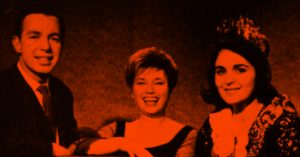The music
The music of Rediffusion

A quick-reference guide to the startup and ident music used by Associated-Rediffusion and Rediffusion, London. Companion to the article Seen and Heard, which discusses Authority Announcements and related material, and includes some clips which contain material mentioned here.
Opening Night, September 22, 1955, included three pieces of startup music:
- Variations on a theme of The British Grenadiers (Trad., probably arr. Adolf Lotter). Lotter was the principal double bass in the Beecham Philharmonic Orchestra. Preceded the announcement (by Leslie Mitchell) “This is London”, which was followed by
- Fanfare No. 1, from Five Fanfares, by Charles Williams. Preceded the main body of the announcement, which was followed by
- Excerpt from Sir Edward Elgar’s overture Cockaigne (In London Town) Op. 40, probably played by the Hallé orchestra conducted by Sir John Barbirolli, A-R’s musical director at the time.
This arrangement of startup pieces continued for about a year: Grenadiers was dropped in the summer of 1956, probably as a result of being seen as too ‘militaristic’ in view of the Suez Crisis.
For some initial period, ending no later than 1956, possibly during afternoon and/or morning broadcasts, an alternative startup was also used. This had the same structure as the above, but with a female V/O. It also replaced Grenadiers with an arrangement of Richard Addinsell’s orchestral Prelude from the music for David Lean’s 1945 movie adaptation of Noel Coward’s Blithe Spirit. The fanfare and excerpt from Cockaigne were unchanged.
Idents from this period initially used an eleven-note phrase taken from Cockaigne and arranged for three trumpets and three trombones. This was later replaced by two trombones playing figures representing the Morse Code for the letters ‘A-R’ (“dit-dah, dit-dah-dit”), accompanied by the sound of a Morse key. This ident phrase continued to be used for some time.
From September 1956 to late 1957, the company used Eric Coates’ Music Everywhere. This piece, written in 1948, was adopted by Rediffusion some years before there was any thought of a television company, possibly when the Rediffusion name first began to be used by Broadcast Relay Services Ltd. The piece was renamed (with Coates’ permission), the Rediffusion March. It seems likely that when Grenadiers was dropped, Coates’ piece was brought into play for startup purposes temporarily until a specially-commissioned theme could be written and recorded.
Virtually nothing is known about ‘S. Bates’, who composed the resulting Associated-Rediffusion March, used by the station from early 1958 until it became Rediffusion, London in 1964. He is thought to be a member of the A-R studio orchestra.
The change of name to Rediffusion, London was accompanied by a dramatic change in on-screen style, and with it came a new musical identity, this time the famous Widespread World of Rediffusion, written by noted composer John Dankworth. (See Gavin Sutherland’s analysis of this piece on Transdiffusion. – he also notated the score shown above) There was also an accompanying ident.
Thanks to Gavin Sutherland for his assistance in preparing this article
About the author
Born in England in the early 1950s, Richard G. Elen has been writing professionally for over a quarter of a century, and has launched, edited and contributed to leading entertainment industry journals on both sides of the Atlantic. He has also been a recording engineer and producer, a partner in an advertising agency and a marketing executive, and was one of the first to begin to develop the Internet's World Wide Web.




